 Janus Head Janus Head
11.1&2

Travels Inside the Archive
Robert Gibbons
Edge of Maine Editions

Beyond Time
New & Selected Work
1977 - 2007
Robert Gibbons
 The Age of Briggs & Stratton The Age of Briggs & Stratton
Peter Culley
|
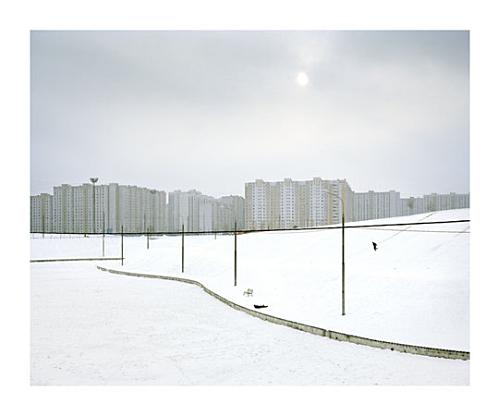
Alexander Gronsky
_______________________
Thin-Sliced Thoughts and Theory's Ends
Mark Andrejevic
MediaTropes
Abstract
This article explores a variety of techniques for “cutting through the clutter” in an era of information glut: body language, neuromarketing, and data mining. It traces connections between these different strategies by arguing that they converge on an understanding of the social, political, and economic roles of information, which challenge the empowering promise of the digital information revolution. The attempt to short-circuit the discursive content of communication in order to get straight at the underlying sentiment is symptomatic of an impasse that Slavoj Zizek describes in terms of the demise of symbolic efficiency. The promise of direct access to emotional truths modeled, for example by deception detection experts on the show Lie to Me compensates for what might be described as a vernacular postmodernism in which representations are understood to be not only subject to contrivance, but completely reducible to it. The result, this article argues, is a shift in the relationship of information to power, and thus in strategies for challenging or resisting it....(more)
MediaTropes Vol. II, No. 2 (2010)
via I cite
_______________________

Wallace R. MacAskill
Nova Scotia photographer
(1887 - 1956)
_______________________
Light breaks where no sun shines;
Where no sea runs, the waters of the heart
Push in their tides;
And, broken ghosts with glow-worms in their heads,
The things of light
File through the flesh where no flesh decks the bones.
A candle in the thighs
Warms youth and seed and burns the seeds of age;
Where no seed stirs,
The fruit of man unwrinkles in the stars,
Bright as a fig;
Where no wax is, the candle shows its hairs.
Dawn breaks behind the eyes;
From poles of skull and toe the windy blood
Slides like a sea;
Nor fenced, nor staked, the gushers of the sky
Spout to the rod
Divining in a smile the oil of tears.
Night in the sockets rounds,
Like some pitch moon, the limit of the globes;
Day lights the bone;
Where no cold is, the skinning gales unpin
The winter's robes;
The film of spring is hanging from the lids.
Light breaks on secret lots,
On tips of thought where thoughts smell in the rain;
When logics dies,
The secret of the soil grows through the eye,
And blood jumps in the sun;
Above the waste allotments the dawn halts.
- Dylan Thomas
_______________________
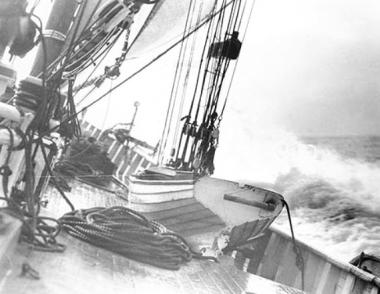
Wallace Robinson MacAskill
_______________________
STULTIFERA NAVIS (Ship of Fools)
Richard Hoffman
(....)6.
We ferried our sullen sirens to the rocks and
handed them the music we composed so long ago
(of crooners' modulated vowels sustained vibrato
and jingles for soap and beer that came to occupy
our parents' minds) we had, already, forgotten.
We set the time when they would shed their ever
filthier silence, wired, a lyric bomb, and sing.
It wasn't magic. Even our amnesia was strategic.
O land I love! I was born to your bright promise
and the hard terms of your peace. What I want's
to be your one and only, take me in your arms
and gimme, baby. Gimme weregild of the slain
enslaved, the backpay of the disappeared, gemstones
someone's bound to wear, it may as well be me.
...(more)
_______________________
The Politics of Anger
John Louis Lucaites
no caption needed
Too often, it seems, we treat anger as an inherently irrational and inchoate expression of political engagement, typically representing it in the roar of an inarticulate mob. But as Aristotle made clear, anger is not madness. Indeed, it is and can be a legitimate and rational political emotion, quite necessary as a motivational resistance to the forces of injustice, and made effective in the careful and deliberate performance of the cultural norms of appropriate social and political recognition. The problem is that in contemporary times we lack useful models for the effective expression and enactment of productive political anger. Either we get the silly rants of groups like the “tea-baggers,” which function as little more than a parody of anger, or we get the truly irrational futility of individuals flying planes into buildings or going on shooting rampages. Neither serves the purposes of a robust democratic public culture.
What we need are exemplars of the performance of political anger that animate the demands for justice and restitution in pointed but measured ways. Where we will find them, it is hard to say, but in the meantime it is important to keep in mind that the political scenarios in which we frame enactments of anger carry a powerful normative force that should never go unmarked as transparent expressions of affect....(more)
_______________________
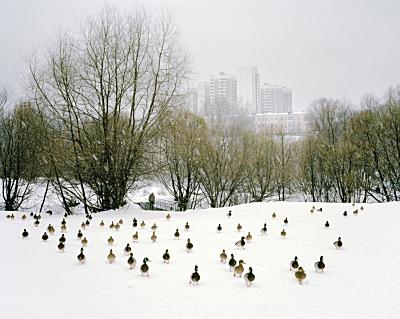
Pastoral
Alexander Gronsky
_______________________
Well-equipped Men
John Tranter
Blackbox Manifold
Lately I’ve been looking at old-fashioned plaids.
I’m sure I deserve a beautiful suit. Call me,
before the Hong Kong tailor leaves town.
I hear the songs popular in the seventies
yet I shall never return to the past, that attic,
nor bid for the tawdry items that were on offer
from the poorest chamber-pot to the glittering jewel,
oh God, if we had been in clever Cleveland --
I would have voted for a dazzling uniform
in a silent room, and a loaded sawn-off shotgun,
sawn in half for a leading role in the documentary
about the muscley brothers in the rusting truck
on target for the abortion clinic: the news story
inflamed them and no one is responsible.
...(more)
Blackbox Manifold
Current Issue: No. 4 (February 2010)
_______________________

Alexander Gronsky
_______________________
The Introvert
Charles Bernstein
Blackbox Manifold
after Wordsworth’s “The Hermit”
Suddenly, those fears
Your first and ever-dreaded foe! Suddenly
You turn from some imbecile prose
That rails and ricochets against chimeric life
With dictums ripped from surface
Scars by wanton brains, a moral pose
Thoughtlessly ill-fit to Orphic lyre
And with your beauteous breath you slowly
Refuse refuge, jolting yourself with jeers
That anxious years will bring an empty heart
And blinded thought.
Charles Bernstein - two poems

as if nothing happened
Dorothee Deiss
via Crashingly Beautiful
_______________________
From "Mozart's Third Brain"
Göran Sonnevi
Translated from the Swedish by Rika Lesser
LXIV
(....)
We move through the centuries
Faced with destitution's images The blood of the martyrs is clasped, cradled
As if Agave were clutching the head of Pentheus; the blood runs
down into a bowl; a grail The Etruscan votive sculptures
are thin as sticks; are by Giacometti What do the dead
see? What do they see that even the dying do not see? What
Hesperian fruits, shining Pomegranates; golden fruits?
By the Baths of Diocletian are orange trees Hidden
inside there, Michelangelo's basilica, is full
of power, stone-dead, of the living Small flames burn for believers
Policemen stand in groups, some with bulletproof vests, submachine guns
The door to a bordello stands open Private health clubs
with sauna, massage At Stazione Termini are all kinds of people;
from all over the planet Everything stands wide open, glowing poverty
...(more)
TYPO 7
_______________________
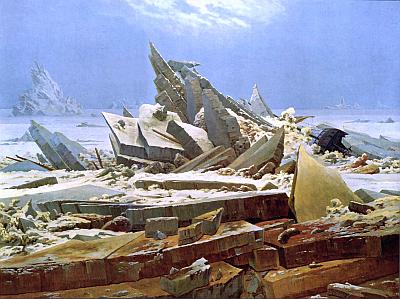
The Polar Sea
Caspar David Friedrich
1823–1824
_______________________
The Aesthetics of Decay: Nothingness, Nostalgia, And the Absence of Reason
Dylan Trigg
available at aaaarg
With Friedrich, the ruin ceases to be an object of curious detachment or capricious fancy. It has become a symbol in which subjectivity converges with representation. As verification of this, commenting on Impressionism, Friedrich writes: “The artist should not only paint what he sees before him, but also what he sees within him” (cited in Vaughn, 1972, p. 14). This logic of subjectivism implicates a correspondence denoted, not by the impression the ruin makes on the subject, but by the active content of the subject upon the ruin. For Friedrich, this logic was inspired by post-Hegelian idealism, evident in the likes of Schelling, Novalis, and Fichte. Idealism enabled the artist to render nature his or her own by positing the causal quality of the subjective mind. Despite Friedrich’s Protestantism, the simplistic view associated with the Christian perspective on decay was repugnant for the painter. Decay, dissolution, and decline, more than moralistic fables, enabled the possibility of existential affirmation to emerge: “Why, this question is often put to me,” Friedrich writes, “do you choose so often as a subject for painting death, transience, and the grave? In order to live …one must submit oneself to death many times”
Dylan Trigg blogs at Side Effects
_______________________
Toward a Democritean Gaze
Introduction to Spectral Evidence: The Photography of Trauma
Ulrich Baer
aaaarg - free reg. req.
As the counterpart to the model of time-as-river and history-asnarrative, the Democritean conception of the world as occurring in bursts and explosions, as the rainfall of reality, privileges the moment rather than the story, the event rather than the unfolding, particularity rather than generality. The following fragment from Democritus has an extraordinary relevance for our understanding of photography—a relevance already recognized by Benjamin in the late 1930s as the medium that endows the fluctuation of light waves and the movement of particles with the appearance of stable objects and events.By convention sweet and by convention bitter,
by convention hot, by convention cold,
by convention colour;
but in reality atoms and void.
—Democritus
_______________________
Plasticity at the Dusk of Writing—Introduction
Clayton Crockett
An und für sich
What I came to appreciate was how her profound and complex reading of form in terms of plasticity challenged Derridean and Levinasian notions of the trace, and this affects the discussion surrounding the return of the religious and what Jean-Luc Nancy calls the “deconstruction of Christianity.” I have been and still am influenced and impressed by the weak messianic force that Derrida draws from Walter Benjamin and deploys in ethical and political contexts. It was with considerable fear and trembling that I developed a critique, relying upon Malabou’s philosophy. And I don’t simply reject or dismiss this idea of a weak messianic force, but I do understand it differently. In any case, as Malabou herself writes about deconstruction, it’s not a question of rejecting or surpassing deconstruction, but seeing how writing expands into a sort of generative plasticity. I was able to see how plasticity is a much more subtle and supple question of form, especially considering its three aspects: the ability to give form; the capacity to receive form; and finally, and most intriguingly, the power to annihilate form, which is an auto-destructive force. So plasticity helps me see force as immanent to form, which also seems close to Deleuze, as opposed to transcendent to it, as some of the religious and theological appropriations of Derrida and Levinas appeared to be doing, although again this question of transcendence is very slippery and it’s easy to overstate or caricature. There are a lot of critiques of Derrida out there that are very stupid, although I don’t think Malabou’s is one of them.
Plasticity at the Dusk of Writing Book Event: AnnouncementAn und für sich
.....................................................
Plasticity at the Dusk of Writing: Dialectic, Destruction, Deconstruction
Catherine Malabou
Translated by Carolyn Shread, Foreword by Clayton Crockett, and Introduction by Carolyn Shread
Columbia University Press
google books version
Plasticity and Elasticity in Freud's "Beyond the Pleasure Principle"
Catherine Malabou
diacritics / winter 2007
aaaarg - free reg. req.
Counterpath
Catherine Malabou and Jacques Derrida
aaaarg - free reg. req.
The Future of Hegel:
Plasticity,Temporality and Dialectic
Catherine Malabou
translated by Lisabeth During
aaaarg - free reg. req.
A Conversation With Catherine Malabou
Journal for Cultural and Religious
Theory, vol. 9 no. 1 (Winter 2008)
aaaarg - free reg. req.
_______________________
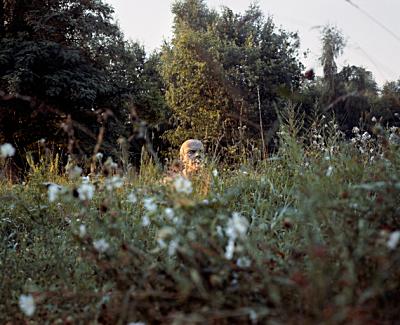
Dorothee Deiss
_______________________
the flowers of evil in a Brussel's estaminet
Roger Gathman
Limited, Inc.
I like to think of Marx in Brussels, that capital of compromise, sitting in Le Cygne – apparently his favorite estaminet – thinking about the course of events. The young Marx, who felt that the course of events was going in his direction, rather than the older Marx, aware that events are tricky and baffling things. Both, though, already feel – such is my novelistic intuition – that the scale of their thought exceeds the scale of their audience. This is, perhaps, the great modernist anxiety – exactly at the same time that the popular press brings an unparalleled audience to certain writers, it seems, capriciously, to exile others. And yet, what is the correlation between the embodied work and the scale of the readership? In one domain after another, one sees that intellectual production is standardized and put on a schedule for the widest possible use, while at the same time it suffers an interior trivialization as it is wrenched out of the relationships – that mode, ultimately, of connected friends and allies – in which it used to exist. It is in this sense that I – rather imaginatively – connect Marx’s exile in Brussels with Baudelaire’s later self-inflicted exile in the same city....(more)
_______________________
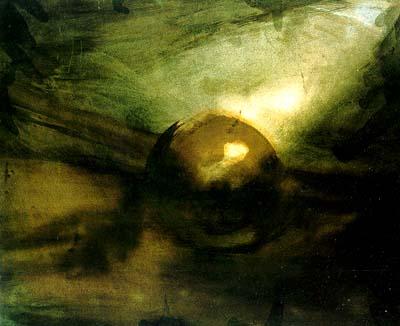
Planet
ca. 1854
Victor Hugo
b. Feb. 26, 1802
_______________________
The Horror of Disconnection: The Auratic in Technological Malfunction
Martin Dixon
http://www.transformationsjournal.org/journal/issue_15/article_06.shtml
... when the line goes down we are returned to the hinc et nunc of our physical circumstances without the phatic niceties (“thanks for calling, see you soon”) that not only provide formal closure and break our communicative contract but prepare us for the psychic shock of being alone once more. But, as all who use this technology will know, in the event of disconnection, as the signal strength dies and the state of full, pristine connectivity bleeds into a rebarbative silence, a transitional sonic disfiguration occurs: the voice of the interlocutor suffers violent torsions, a garbled – oddly aquatic – strangulation. What happens here?
Perhaps this phase just prior to disconnection deserves no particular attention. But I suggest otherwise. What we hear as distortion is the reintroduction of distance into the binding warmth of vocal intimacy: the distortion screens and stifles the intimacy with the other by way of a monstrous manifestation of technology’s own nature. And, symmetrically, as the other is distanced we feel the presence of the technical device itself: it is suddenly there. Its proximity to our ear is now absurd, perhaps abhorrent. The technology, now non-continuous with our desire, lacking that “extra” dimension of the virtual, appears opaque. No longer disappearing into its function, it solidifies into itself, into what it is rather than what it does. The virtuality and liveliness of the voice in our ear dissolves into the actuality of the compromised machine in our hand. ...(more)
Walter Benjamin and the Virtual: Politics, Art, and Mediation in the Age of Global CultureTransformations Issue No. 15 November 2007
_______________________
The politics of aesthetics: the distribution of the sensible
Jacques Rancière
aaaarg - free reg. req.
_______________________
San Francisco Fifty Years Ago
Kenneth Rexroth’s complete columns for the San Francisco Examiner
bureau of public secrets
_______________________

photo - mw
_______________________
Clarence Darrow on the Situation of Crime and Criminals
"Crime and Criminals: Address to the Prisoners in the Chicago Jail" (1902)
The Situationist
This address is a stenographic report of a talk made to the prisoners in the Chicago jail. Some of my good friends have insisted that while my theories are true, I should not have given them to the inmates of a jail.
Realizing the force of the suggestion that the truth should not be spoken to all people, I have caused these remarks to be printed on rather good paper and in a somewhat expensive form. In this way the truth does not become cheap and vulgar, and is only placed before those whose intelligence and affluence will prevent their being influenced by it.
—
Clarence Darrow
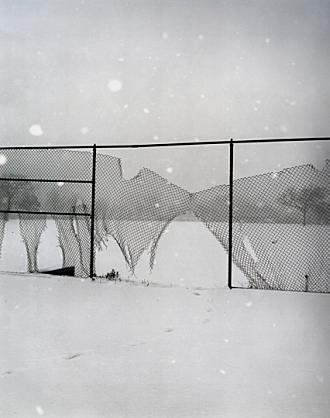
thin on the ground
Greg Hapern
via Jim Johnson
_______________________
Hareways
Struan Gray
Twiglog
(....)
Naturally, everyone is complaining. Trains are delayed, roads unploughed, heating bills up; and the snow itself too cold, too white, too wet, too deep: too much – altogether too much. I annoy as many as I can by smiling Cheshire-like through the spindrift, cheerfully piling up the latest deposits with my trusty snow shovel, and laughing out loud when the sheer weight of encrusted glop finally defeats my attempts to cycle on hub-deep virgin pathways.
Others may moan, but snow brings out my inner puppy. It makes for a world that is clean, bright, legible, and malleable. Inconsequential creativity and destruction accompany every step, and the snowpack’s current surface and structure contain a detailed log of the previous weeks’ human, animal and meteorological activity. Photographically, it is usually regarded as a problem to be solved: the root cause of untamed contrast and heart warming stylistic clichés, but to me, seeing snow as a problem is formally equivalent to the idiot killjoys who claim to yearn for our more usual climate of steady rain and omnipresent mud. Photographing in the cold does have its technical issues – most urgently, how to stop fingers from freezing – but I love snow for the way it divides figure from ground; decorates and enhances detail; abstracts and purifies terrain; and perpetually adjusts its own shape, density, colour and texture....(more)
_______________________

photo - mw
_______________________
John Tranter Interview
The Argotist Online
BH: The opening line of “The Alphabet Murders”—“After all we have left behind”—offers a sense of intimacy, a shared world with shared experiences. Were you intending to speak to and from a collective, or was it more personal, more specific than that?
JT: I think I was talking about leaving behind the history or the tradition of literature in English: Shakespeare, the Romantics, the early Modernists. And Callimachus, and Sappho, and so on. Just as we have left World War One and World War Two behind, so we have left “literature” behind. But of course we haven’t left the modern world behind. It follows us like a dog that never ages, becoming more modern every day.
That stanza ends “So I write to you ‘from a distant country’”, a quote from Henri Michaux, whose distant country – a dreamy, mournful place – features eucalyptus trees. I think I had in mind that this “distant country” might have an alternative future, as in a science fiction story, where a wonderful kind of poetry lived, full of passion and energy, and perhaps we could cross over to that universe if we wished hard enough.
(....)
I always feel ambivalent about earnestness. Perhaps because Ernest is my middle name. There I go, deflating earnestness again. That anxiety about appearing too full of deep feelings, I think it might have something to do with my growing up in an Australian country town. Australians have a laconic sense of humour. So in my writing, I often feel divided between a need to speak about deeply meaningful things, and a fear of looking like a manipulative phoney with his heart on his sleeve. Sentimentality and cynicism are the two sides of that coin. It’s always spinning in the air in front of me.
As Oscar Wilde said, “All bad poetry springs from genuine feeling.” That’s not quite true, like most of Wilde’s aphorisms. And of course not all genuine feeling produces bad poetry, but it often does. Some of the most horrible frauds write poetry that is dripping with sincerity. In my own writing I have found that a strong emotional feeling produces poetry that needs to be kept in a drawer for several months, when the feeling has evaporated and a cooler critical intelligence can be employed to repair the poem’s worst stylistic excesses.
But I try to leave room for sincerity. There’s nothing wrong with sincerity, as long as you’re not too earnest about it. ...(more)
_______________________
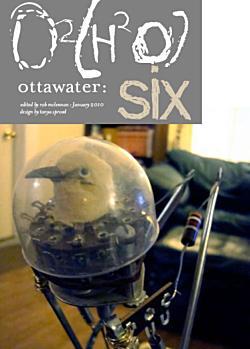
Ottawater 6
editor/publisher rob mclennan
The sixth issue features work by various residents current and former, including: Sylvia Adams, John Barton, Sara Cassidy, Michael Dennis, Andrew Faulkner, Spencer Gordon, Gwendolyn Guth, Phil Hall, Marilyn Irwin, Robyn Jeffrey, Anne Le Dressay, Rob Manery, Karen Massey, Marcus McCann, Heather McLeod, Christian McPherson, Soraya Peerbaye, Richard Rathwell, Peter Richardson, Janice Tokar, Paul Tyler, Priscila Uppal and Catriona Wright, and artwork by Reid McLachlan, Heather Munro, Gail Bourgeois, Stefan Thompson, Marc Adornato, Stefan Grambart, Pedro Isztin, Beaston, Danny Hussey , Rebecca Mason and Dan Martelock.
_______________________
Profile: Spinoza
Christopher Norris
Here again what is so remarkable about Spinoza’s reception-history over the past four centuries is the pattern of extreme and sharply conflicting responses to which his work has given rise. If the reason lies partly in the very nature of his thought – its extraordinary power to evoke such disparate and yet (on their own terms) textually warranted modes of interpretation – then it is also a product of those still unresolved issues (especially free will/determinism and mind/body dualism) that continue to vex and divide the philosophical community. Yet the strongest claim on Spinoza’s behalf is his having pointed a way beyond them through his idea that we achieve the greatest degree of active or self-realizing power through exposure to the maximum possible range of formative, provocative, capacity-stretching, psycho-physically stimulating inputs from various sources. Thus his work may fairly be said to signpost the most promising escape-route not only from the sorts of problem that he encountered with Descartes but also, more impressively, from some of the most intractable dilemmas handed down by those later thinkers – Kant preeminent among them – who, while criticizing certain aspects of Cartesian thought, can be seen to have pressed yet further (and bequeathed a yet greater burden of unresolved problems) in a dualist direction. That many of these are still active topics of philosophical debate and still no closer to an adequate solution is one good reason to revisit Spinoza’s extraordinary writings. ...(more)
_______________________
Round Midnight:
Tortillas and the Corporate State
Joe Bageant
Near midnight and I am making tortillas on an iron skillet over a gas flame. Some three thousand miles to the north, my wife and dog nestle in sleep in the wake of a 34-inch snowstorm, while the dogs of Ajijic are barking at the witching hour and roosters crow all too early for the dawn. While my good Mexican neighbors along Zaragoza Street sleep.
Yet here I am awake and patting out tortillas, haunted by the empire that I have called home most of my life.(....)
Americans are hope fiends. We always see hope somewhere down every road, chiefly because honestly looking at the present situation would destroy just about everything we hold as reality. Personally, as I often state and catch readership hell for, I do not like hope. When Obama ran it up the flagpole for us to salute, and so many saluted, my blood chilled. Made me feel that we were all in deeper shit than I had supposed (Nevertheless, I reluctantly voted for Obama. At the time it seemed It was either Obama, or continuing war, debt, and diminishing civil liberties. Ha!) Hope is magic thinking, believing that somehow, some larger unknown force is in motion to set things right.
The world is what it is, and its injustices are set right by peoples and nations morally intact enough to challenge its malevolent forces.
Hope is political pabulum for an infantilized nation....(more)
_______________________

Ralph Eugene Meatyard
1958-60
_______________________
Depression, Affectivity, and Capitalism
larval subjects
What sorts of structural couplings generate sad structural couplings where, by virtue of the impossibility of navigating the perturbations generated by the other object, the social system, the neurological system effectively breaks down and withdraws? The mapping of virtuality and structural couplings between different strata of objects thus allows 1) a plotting of pathological social structures that lead to the effective collapse of one type of structure, the body (as typified in anxiety disorders, schizophrenias, and depressive disorders), but also 2) the suggestion of other alternative forms of mentality that might be produced through other structural couplings to the social system and other ways of organizing the social system. However, while the politicization of affectivity and mentality should be a key terrain in struggles against post-Fordist, neo-liberal systems of capital (and here the work of Massumi, Protevi, and DeLanda are especially important), what should be avoided is the blaming of those who suffer (as we’ve sometimes seen here in the blogosphere) for simultaneously treating their malady as social and political and highly individual and in need of relief....(more)

Bucks County Winter
Edward Willis Redfield
1869 - 1965
_______________________
Four poems
Robert VanderMolen
jacket
Trails
It’s relaxing here, the sense of here,
Except for train tracks
Hidden over the rise--
The freight that stumbles
Through before morning,
Like some misjudgment
From the evening before,
Something that rises up
Out of the murk of sleep and is true
Wedges and edges of snow
Half-thawed, then frozen again
...(more)
_______________________

Lucifer
1890
Franz von Stuck
1863 - 1928
_______________________
Nietzsche's Demonology
Beyond Good & Evil in the Mode of Information
Daniel White
ctheory
The neoliberal myth of informatics is that the science is rational, independent of embodiment, and serves to control the power machinery of terminal conflict out of which it was born: the weaponry in whose escalating spiral -- Nietzsche's Kreislauf -- it struggles to reach maturity in a new War in the Mode of Information. Like Gregory Bateson's axe, informatics is a tool allegedly under the managerial control of a rational, executive "self." This essay challenges that myth, including its ideological foundations in what Max Weber called the Protestant Ethic. It is a thought-experiment in the study of Nietzsche, technology, and culture. It critically uncovers the foundations of the aforementioned myth and envisions the alternative intellectual architecture of a joyous information science. Its method is derived from what I call Nietzsche's "demonology": the disciplined activity of critically exorcising the intellectual "daemons" or "intelligences" that generate and actuate a life-denying iconography of "good" and "evil" in order to craft a manageable order out of chaos. The daemonological tool of choice is Nietzsche's Hammer: designed to shatter dead idols and to sculpt living artifacts. The present essay thus begins in the midst of internecine conflict and traces an alternative theoretical trajectory for Nietzsche's ideas, arcing through a postmodern textual ecology toward a life-affirming, joyous science. ...(more)
_______________________
The scream of geometry
(modified excerpts)
Andrzej Tichy
Translated from the Swedish by Linda Rugg and Andrzej Tichy
eurozine
What do you recall of the places where you passed through, stopped by, slept? Brest, Uzjhorod, Oradea? Edirne, Igoumenitsá, Dubrovnik? Annaba, Melilla, Punta Almina? Subotica, Brcko, Tetovo? Vlorë, Odessa, Bad Schandau? How do you manage to cross the borders? What do you do with the memories of public lavatories, the rivers, the ferry berths, and the barracks? What do you recall of the Mediterranean Sea, the Adriatic Sea, the Black Sea? Why is it me remembering your memories for you, why am I sitting with atlases, drawing these hopeless lines and making calculations, why can't I see any logic in the moves I arrange for you? Why am I asking these questions at all when I know that you won't answer? When I know that you've never been to these places but to other ones, mystical places where phantoms like you belong. I dream your dreams of abandoned customs houses, of soldiers in depopulated, rain-soaked settings, of dishevelled children smoking cigarettes longer and thicker than the fingers holding them, of women in kerchiefs, carrying string bags. Of habitually drunk policemen and large gangs of armed teenaged boys. I'll be your eyes when you see sheep being slaughtered to be roasted over an open fire, when you see sandy hens and wind-torn pastureland. I want to be your body as you're insulted by persons in authority, as you are humiliated, beaten and tortured with methods yet unknown. I know you despise me for this, I know that you scorn my need to hear these stories and see these images, I know that you dream of entirely different things than my soldiers shooting that shot, you don't dream my dreams of evergreen forests, broadleaf forest, and tundra. Of freeway, main roads, and mountain paths. Of Serbian rapists and Romanian beggars, Polish amphetamine manufacturers and Egyptian taxi drivers, of bearded imams and orthodox monasteries, of unserviceable East German trucks and Bulgarian cargo ships, where Arabs huddle with Africans and Asians, skin to skin, sweating, freezing, tired, hysterical, sleeping and tormented refugees headed for a place that is yet unspeakable.
...(more)
_______________________
From Of Being Numerous
George Oppen
9
‘Whether, as the intensity of seeing increases, one’s distance from Them, the people,
does not also increase’
I know, of course I know, I can enter no other place
Yet I am one of those who from nothing but man’s way of thought and one of his dialects
and what has happened to me
Have made poetry
To dream of that beach
For the sake of an instant in the eyes,
The absolute singular
The unearthly bonds
Of the singular
Which is the bright light of shipwreck
...(more)
_______________________

Hendrik Willem Mesdag
b. Feb. 23, 1831
_______________________
A Rothko Conversation
Lesley Jenike
“We favor the simple expression of the complex thought. We are for the large shape because it has the impact of the unequivocal. We wish to reassert the picture plane. We are for flat forms because they destroy illusion and reveal truth.”
- Rothko
He had a ticket to an all-age show. Is that, you asked, an excuse? No.
To end one’s life is to force matters to a conclusion the universe
Wouldn’t agree to— utterly American in his rapacity despite the subtle
streaks of color. The cool, waiting folds of a feather bed are graves
in another country, dug to clasp bodies we didn’t know or forgot
in an earthy embrace this painter calls bleeding—a pint of oneself
escapes while the rest, diminished, keeps flowing. Arteries of streets
and country paths, no matter, all lead to one heart and that is, you sd,
the core. No more. No less. Your brand of religiosity, I sd, is a mess.
...(more)
Drunken Boat #11
Lesley Jenike's blog

photo - mw
_______________________
Radio
Tom Clark
Don't hurt the radio for
Against all
Solid testimony machines
Have feelings
Too
Brush past it lightly
With a fine regard
For allowing its molecules
To remain 100% intact
Machines can think like Wittgenstein
And the radio's a machine
Thinking softly to itself
Of the Midnight Flower
As her tawny parts unfold
(....)
The radio is thinking a few licks of its own
Pianistic thoughts attuned to tomorrow's grammar
Beautiful spas of seltzery coition
Plucked notes like sandpaper attacked by Woody Woodpecker
The radio says Edwardian farmers form Minnesota march on the Mafia
Armed with millions of radioactive poker chips
...(more)
_______________________

Relief
Broadcasting House
London, England
Eric Gill
1931
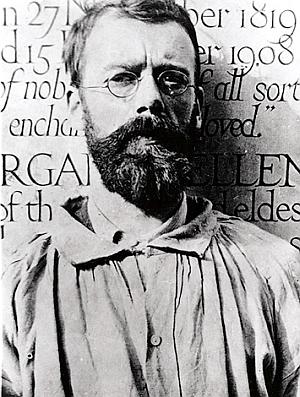
Eric Gill
22 February 1882 – 17 November 1940
_______________________
The Renaissance Of 1910
Reflections on Guy Davenport’s Poetics
Marjorie Perloff
sibila
Again and again, in the essays collected in The Geography of the Imagination (1981), Guy Davenport refers to a “renaissance” taking place “around 1910". The clearest statement comes in the essay called "Narrative Tone and Form", reprinted from the Guy Davenport-Ronald Johnson issue (1976) of Vort, that remarkable journal founded and edited by Barry Alpert. Davenport writes:
Our age is unlike any other in that its greatest works of art were constructed in one spirit and received in another.
There was a Renaissance around 1910 in which the nature of all the arts changed. By 1916 this springtime was blighted by the World War, the tragic effects of which cannot be overestimated. Nor can any understanding be achieved of twentieth-century art if the work under consideration is not kept against the background of the war which extinguished European culture. . . . Accuracy in such matters being impossible, we can say nevertheless that the brilliant experimental period in twentieth-century art was stopped short in 1916. Charles Ives had written his best music by then; Picasso had become Picasso; Pound, Pound; Joyce, Joyce. Except for individual talents, already in development before 1916, moving on to full maturity, the century was over in its sixteenth year. Because of this collapse (which may yet prove to be a long interruption), the architectonic masters of our time have suffered critical neglect or abuse, and if admired are admired for anything but the structural innovations of their work.
This is vintage Davenport: the mix of remarkable precision — names and dates—with large-scale generalization, of historic pinpointing with evaluative conclusion. A similar point is made in “The Pound Vortex” (1972), where Davenport declares: “What we call the twentieth century ended in 1915. Those artists who survived the collapse of civilization at that point completed the work they had planned before then, when the looked forward to a century of completely different character” (GI 166). And again the roll call of names includes Pound and Joyce, this time along with those killed in or because of the war: the Polish-French sculptor Henri Gaudier Brzeska, the Italian architect Antonio Sant’Elia, the French poet Apollinaire and novelist Alain-Fournier.
What does it mean to say “the century was over in its sixteenth year,” that after 1915, there was no more significant artistic innovation?...(more)
_______________________

Aya Fujioka _______________________
Writing on Goya
Robert Gibbons
One doesn’t simply run head-on into Goya snorting some interpretation, or other.
Nor stroll through the gallery of history as Nietzsche warns against in his
Untimely Meditations without suffering life from the ground up. Rather, run
gauntlet. Fight against one’s Time. I’m not gazing at any specific work, but
Goya’s vicious brushstrokes, fierce blacks, penetrating vortexes, barely audible
grunts & barks as titles swirl, hurt brain & viscera, make black blood blue. To get
to Goya is to go through Lorca through Guernica through gore of bull & sword,
peasant & starvation, through that which is unimaginably worse. One doesn’t
simply say rape, torture, mutilation without potential disastrous ramification, but
blood is in the veins till running from gash & wound into the ground, when Death
grants another pardon in order to lift pen, & crack voice open as vessel. Stark,
raving, angered at injustice, typing on the keyboard till fingerprints are raw, then
gone.
Time Capsule
is a bi-weekly series featuring the poetry of Robert Gibbons
The Killing Floor: Notes from the Editor of the Boston Blues Society
_______________________
The Courage of the Present
Alain Badiou
[Originally published in Le Monde, 13 February 2010. Translated by Alberto Toscano]
posted at infinite thØught
So what can the principle and the name of a genuine orientation be today? I propose that we call it, faithfully to the history of the politics of emancipation, the communist hypothesis. Let us note in passing that our critics want to scrap the word ‘communism’ under the pretext that an experience with state communism, which lasted seventy years, failed tragically. What a joke! When it’s a question of overthrowing the domination of the rich and the inheritance of power, which have lasted millennia, their objections rest on seventy years of stumbling steps, violence and impasses! Truth be told, the communist idea has only traversed an infinitesimal portion of the time of its verification, of its effectuation. What is this hypothesis? It can be summed up in three axioms.(....)
I am convinced that a third historical sequence of the communist hypothesis will inevitably open up, different from the two previous ones, but paradoxically closer to the first than the second. This sequence will share with the sequence that prevailed in the nineteenth century that fact that what is at stake in it is the very existence of the communist hypothesis, which today is almost universally denied. It is possible to define what, along with others, I am attempting as preliminary efforts aimed at the reestablishment of the communist hypothesis and the deployment of its third epoch.
What we need, in these early days of the third sequence of existence of the communist hypothesis, is a provisional morality for a disoriented time. It’s a matter of minimally maintaining a consistent subjective figure, without being able to rely on the communist hypothesis, which has yet to be re-established on a grand scale. It is necessary to find a real point to hold, whatever the cost, an ‘impossible’ point that cannot be inscribed in the law of the situation. We must hold a real point of this type and organize its consequences. ...(more)
_______________________

photo - mw
_______________________
Feral Children: A Collective History
Amber Sparks
The Collagist
(....)They inhabit the woods of Croatia, Romania, Denmark, Austria, Canada, Siberia, the Ukraine, Poland, Argentina, Germany. Or the wilds of Brazil, Uganda, South Africa, Sierra Leone, Kenya, Indonesia, Burundi, Mauritania. Or the waters of the Aegean Sea, the Black Sea, the Indian Ocean, the coast of the Pacific Northwest. Or the property-lining bushes of suburban tract housing, vast garbage dumps, hollow logs, even wide, flat rocks and the soft soil after a hard rain.
After death they can sometimes be found in constellations, scattered over the surface of the sky like seed pearls. (....)
Sometimes the space between the child and the humans is wider than seasons. Sometimes the child grows up in two worlds, a beast-thing, snarling and spewing strange syntax, a deformed and hideous attempt at personhood. Sometimes the child creates a world to grow up in. This child is Atalanta, fast and strong and genderless. This child is Enkidu, friend and muse, inspiration to escape death. These children are Romulus and Remus, conquerors, builders of empire, firsts in a line of firsts. These children are given love tempered by fear, by worship. They are tied to the human race with a strong cord of feeling and fervor.
Sometimes there will be none of these. Sometimes there will be only a still-wild, feckless, fettered child left standing at the edge of the map, ready to push the human race into something as uncharted as it will always be. ...(more)
The CollagistIssue Seven
February 2010
via riley dog
_______________________
"Marks of Indefference":
Aspects of Photography in, or as, Conceptual Art
Jeff Wall
1995
aaaarg - free reg. req.
_______________________
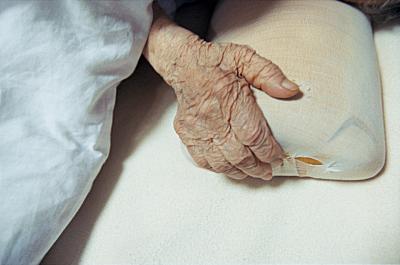
Aya Fujioka — from I Don’t Sleep
japan exposures
via gmtPlus9 (-15)
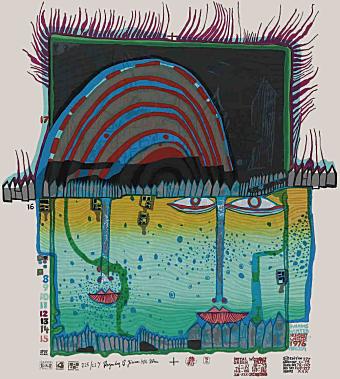 burning winter
Hundertwasser
d. Feb. 19, 2000
_______________________
The Nights of Labor: The Workers' Dream in Nineteenth-Century France
Jacques Rancière
Trans. John Drury
mediafire
Readers should not look for any metaphors in my tide. I am not going to call up the pains of manufacture's slaves, the unhealthiness of workingclass slums, or the wretchedness of bodies worn out by untrammeled exploitation. There will be no exposition of all that here, except through the glances and the words, the dreams and the nightmares, of the characters who will occupy our attention.
Who are they? A few dozen or hundred laborers in their twenties around 1830, who decided, each for himself, just about that time that they would no longer tolerate the intolerable. What they found intolerable was not exactly the poverty, the low wages, the uncomfortable housing, or the ever-present specter of hunger. It was something more basic: the anguish of time shot every day working up wood or iron, sewing clothes, or stitching footwear, for no other purpose than to maintain indefinitely the forces of servitude with those of domination; the humiliating absurdity of having to go out begging, day after day, for this labor in which one's life was lost. There was the oppressive weight of other people as well: the workshop crew with their strut as barroom he-men or their obsequious pose as conscientious workers; the workers waiting outside for a position one would be only too glad to turn over to them; and, finally, the people passing by in carriages and casting disdainful glances at this blighted patch of humanity.
To finish with that, to know why one had not yet finished with it, to change one's life: turning the world upside down begins around the evening hour when normal workers should be tasting the peaceful sleep of people whose work scarcely calls for thinking. This particular evening in October 1839, for example—at 8:00 P.M. to be exact—our characters would be meeting at tailor Martin Rose's place to start a workers' journal.
_______________________
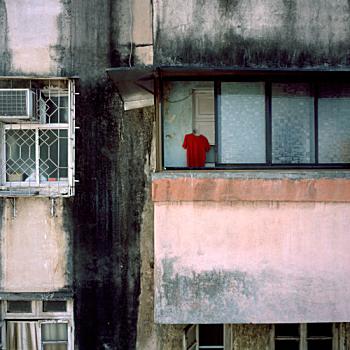
Magda Biernat
via
_______________________
Field Guides to Elsewhere: How We Read Languages We Don’t Read
Hilary Plum
courtesy of Philip Metres
Behind the Lines: Poetry, War, & Peacemaking
a response to Claudia Roth Pierpont's The contemporary Arabic novel
Literature in translation is a crossing of borders, but shouldn’t be thought of just as one of the easier border crossings—tourism, reportage, whatever sort of casual interest or genealogical research—but remembering the violent invasions and migrations that make up our real world and thus the theoretical field of translation. It’s useful to think of reading literature in translation not as a means of gathering “insight and information,” but as a means of experiencing acts of resistance that occur between languages, between cultures, “simply” between reader and writer....(more)
_______________________

Hundertwasser house
Lucian Palomar
_______________________
"To divorce fact from fantasy simply by labeling the one as ‘history’ or ‘medicine,’ and the other as ‘fiction’ is merely to create a new myth about ourselves. Life is inextricably linked with literature, and that is why there are no passports to a myth-free future."
An Odd Kind of Melancholy: Reflections on the Glass Delusion in Europe (1440-1680)Gill Speak History of Psychiatry, Vol. 1, No. 2. (1990)
scribd
abstract
A history of psychiatry, says Tellenbach, should ideally be a 'history of problems', describing not only abnormal psychic states, but also historical attitudes towards them, by recourse to ideological and sociological factors. This research should then lead to rediscoveries of the past, often conceived as new revelations. In accordance with these premises, the present study describes the glass delusion of Early Modern Europe, not as a series of isolated cases, but viewed within a contemporary cultural setting, for the Glass Man's cry of pain is only truly audible through the layman's literature. A brief survey of modern variants on this delusion reveals that man's preoccupation with the problem of body-soul remains largely unchanged.
via Goblin Mercantile Exchange
_______________________

Carson McCullers
(Feb. 19, 1917 – Sept. 29, 1967)
The Heart Is a Lonely Hunter
Carson McCullers
google books
Reflections in a Golden Eye
Carson McCullers
google books
_______________________

fig tree
Patrick Swift
(1927-83)
via John Latta
_______________________
Why Washington Loves The Filibuster
Jonathan Chait
The belief that the filibuster is okay, but minority parties should just use it less often and start acting nicer is the equivalent of the belief that the financial system was totally fine, there just needs to be less greed and more caution. Of course, there are people on Wall Street who believe that, too -- you don't need to change the incentive structure that rewards taking on systemic risk, they say, you just need people to listen to their better angels. This sort of misguided notion is probably endemic to people who sit on the inside of any institution and see it in personal rather than systemic terms. The belief among official Washington that moral restraint can persuade politicians from ignoring their political interests is exactly such a fallacy....(more)
_______________________
Cheney Admits to War Crimes, Media Yawns, Obama Turns the Other Cheek
Jason Leopold
Truthout
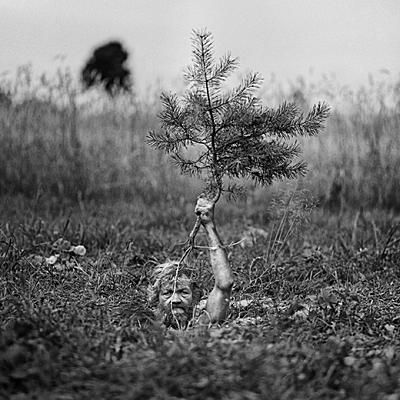
Karczeby
Adam Pańczuk
“In one of the dialects spoken in the east of Poland, which is a mixture of Polish and Belorussian, people strongly attached to the soil they had been cultivating for generations were called ‘Karczeby’. With their bare hands Karczeby cleared forests in order to grow crops. The word karczeb was also used to describe what remains after a tree is cut down — a trunk with roots, which remains stuck in the ground. This also applied to people — it was not easy for the authorities to root them out from their land, even in the Stalinism times. The price they paid for their attachment to their soil was often their freedom or life. After death, buried nearby their farmland, a karczeb himself became the soil, later cultivated by his descendants.”
via Anne Galloway
Space and Culture
_______________________
Squill
Ange Mlinko
boston review
(....)
A seed growing in their mirroring labyrinths.
Twin vegetal wombs in Eustachian tubes sown
with squill, which when the moss is absinthe-
green in the brownscape, is alone
the smallest simplest flower in the cold.
First flower of the year, Easterish
and yet it could be a bold
spy device, an earpiece.
Its cells assembled from history
outside my own window, as the light
stepped up—threw down—in mystery.
And though you say it is right
that no one descended from Uralic
language speakers
has Uralic
language structures
pre-determining the cast of thought until
badly retrofitted in English,
I could not see this Siberian squill,
this earpiece, Easterish,
and not think of the cells of a language
in my sleep, growing out of the frost,
assembled from history, a burned bridge,
as the first division, from which I was lost.
...(more)
_______________________
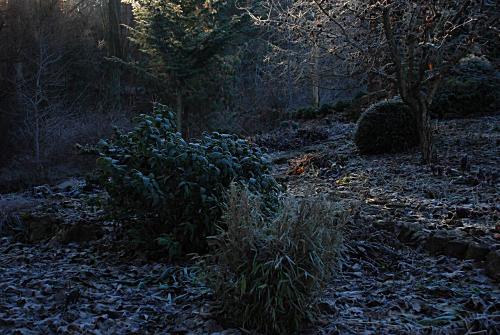
Two years in the garden
Poemas del río Wang
a garden diary
_______________________
Others Letters: Dana Ward -- Thom Donovan
harriet
Dana Ward
The whole notion of publishing presents a pretty funny ring of changes on the matrix that’s most familiar to us— technology/desire/exhilaration/commerce/administered prestige/access. If those things mark our most familiar intersection (there, where the traffic lights all signal a long sick green ‘go’ for violence/exploitation) it can be at times difficult to order my attentions, & my thinking toward ‘having a book’ as it is normatively understood. Of course there’s always this funny thing of how generosity gets mixed up in this, which is to say I write for others, & want my work to be read in the sense that I want it to have a life in the lives of others as the writing of others has such irreducible life in mine. I appreciate so deeply your affirmation of other modes of doing this, & your sense of their vibrancy for achieving that kind of affective presence. That’s a boost for me, as I often look at my own work, sort of scattered out to the wind as its been, & wonder if I’ve gone about things in a useful way. But still I love getting published! Also, as it is w/ you I’m sure, shit, I just love books! But mine are shorter I guess in conception, & this leads to being pretty fugitive, which I value in general, though I don’t want to put TOO much Utopian freight in that place, as if I feared I’d break it’s restless charms. So to answer your question, I think I’m basically done with the narrative of ‘first book’, or I consider the shorter books (chapbooks) I’ve published to be ‘real books’ of the kind that are again normatively marked by their relationship to commercial form/technology/career.
I think the figure of ‘curating attention’ is a fascinating one, & pretty powerful, & gets to the heart of things as far as the web as concerned. Of course we know that curating attention is a first principal of spectacularization, the latter having marshaled all manner of beautiful, radical modes to its own ends. The absorption of any of these modes doesn’t speak, AT ALL, to foreclosure, but what I do think it demands is great care, some qualitative fusion of gentility & wildness that begets a presence steeped in complicity, some dialectical figure that continually acknowledges where it assimilates & where it resists all at once, & I’m always trying to think through a poetics for this, not just for the verse work that I do, but too, for my daily lived way of being in the world. & for me this gets plainly to your sense of ‘how to talk about things’, how important that is, to have some kind of wild, almost feral, discursive life....(more)
_______________________
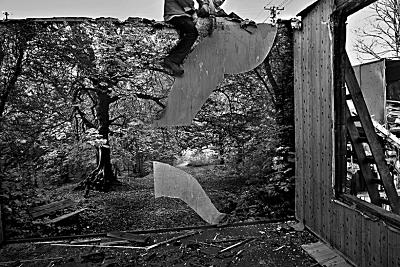
in the rythm of the land
Adam Pańczuk
_______________________
Drunken Boat #11 is up.
including their "first themed nonfiction folio", Life in a Time of Contraction
* M Bromberg
* Jessie Carty
* Rand Richards Cooper
* Mojie Crigler
* Cal Freeman
* Sarah Estes Graham
* Celeste Hamilton
* Julia Phillips
* Paul Lobo Portugés
* Scott T. Starbuck
* Paul Stephens
* Deepak Unnikrishnan
* Nico Vassilakis
_______________________
Film Fables
Jacques Rancière
translated by Emiliano Battista
aaaarg - free reg. req.
_______________________

Two Rivers Lake
Algonquin
photo - mw
_______________________
I stayed on to warm up the ink in which I drown
and to listen to my alternative cavern,
tactile nights, abstracted days.
The unknown shuddered in my tonsil
and I creaked from an annual melancholy,
solar nights, lunar days, Parisian sunsets.
And still, this very day, at nightfall,
I digest the most sacred certainties,
maternal nights, great-granddaughter days,
bicolored, voluptuous, urgent, lovely.
And yet
I arrive, I reach myself in a two-seated plane
under the domestic morning and the mist
which emerged eternally from an instant.
And still,
even now,
at the tail of the comet in which I have earned
my happy and doctoral bacillus,
behold that warm, listener, male earth, sun and male moon,
incognito I cross the cemetery,
head off to the left, splitting
the grass with a pair of hendecasyllables,
tombal years, infinite liters,
ink, pen, bricks and pardons.
Ten Poems
César Vallejo
translated by Clayton Eshleman
Fascicle

Deus ex machina
Tonatiuh Ambrosetti
via Shane Lavalette
_______________________
“To William Cobbett: In Absentia” from Canaan
Geoffrey Hill
Review by Ghivarghese Kuzhikandam
The reading gestured at below will I hope find readers struck enough by the poem to have become curious, at least, about William Cobbett : and for readers to whom the name is new I shall attempt to trace out an impression such as an encyclopaedia might produce. The older Brittanicas devote a page or more to him : and my edition, from the middle of the last century, conjures Cobbett as “that marvel, a literate peasant” : an epithet which seems to sufficiently introduce the persona Hill is addressing. An Oxford Companion to Literature of the same vintage fills out the picture thus : Cobbett is said to have written with “perspicuity and vigour” : but his “honesty and shrewdness” are supposed to have been “marred by an arrogant and quarrelsome attitude, and by wrong-headed prejudices.”
The construals of lyric doing that follow will not seem only extravagant, I hope, to those who are more acquainted -- and minutely, even -- with the contrary creature the political Cobbett was. One could properly say of him that he was “not faithless in standing without faith” as he “kept open vigil at the site” : and saying so properly circumscribes an acting in absentia. The poem’s speaker seems to voice such stigmatising questions, I shall now hazard saying, as Cobbett might have asked were he among us : warranting thusly the bid to let stand the entire deposed authority of vision just as it fell : in the like absence that willing readers here come to inhabit. And what the voice that has so bid us proceeds to invoke appear, themselves, as stigmata of deposed authority and fallen vision :
your righteous unjust and cordial anger,
your singular pitch where labour is spoken of,
your labour :
inasmuch as that has brought to pass reborn Commodity. Cobbett’s political labour is worked -- however crosswise -- into the weft of the industrial transmogrification of English polity. That the contrarian impulses of a “marvellously literate peasant” should have been subducted by the progress of industrial democracy is a properly dialectical irony : since industrialization seems to “democratise” by taming every sort of political animal : by turning each into a voting consumer : the ostensible satisfying of whose “preferences” -- reformulated and concerted by the instruments of “public policy” that the “social sciences” have become -- has long constituted the developed polities, as they are termed, of England and America....(more)
sustainable aircraft
_______________________

Michal Gorstkin Wywiorski
( 1861 - 1926 )
_______________________
the message of crazy horse
Lucille Clifton
i would sit in the center of the world,
the Black Hills hooped around me and
dream of my dancing horse. my wife
was Black Shawl who gave me the daughter
i called They Are Afraid Of Her.
i was afraid of nothing
except Black Buffalo Woman.
my love for her i wore
instead of feathers. i did not dance
i dreamed. i am dreaming now
across the worlds. my medicine is strong.
my medicine is strong in the Black basket
of these fingers. i come again through this
Black Buffalo woman. hear me;
the hoop of the world is breaking.
fire burns in the four directions.
the dreamers are running away from the hills.
i have seen it. i am crazy horse.

Lucille Clifton
(1936 - 2010)
(photo: Lynn Saville) Lucille Clifton: her life and letters
Mary Jane Lupton
google books
_______________________

War Games
Tonatiuh Ambrosetti
_______________________
the book as fortress
Eugene Lim
ereaders already are, or will soon enough become, visually engaging; they are in many ways already more convenient than their analog counterparts — from their hypertexuality to their capacity for instant distribution. however — other than the more apparent rebuttals (worse reading resolutions, less hardiness in bathtubs and backpacks, culture placed on permanent electronic life support), i think the less obvious, more subtle rejoinder is unfortunately the important one. as maryanne wolf argues below, we’re not directly wired to be readers. our instincts to follow distractions and follow titillating, quick bits of visual information (e.g. those involved in stalking that saber-toothed dinner) can overcome (perhaps more often in developing brains) our capacity for deep contemplation (e.g. our ability to consider: some day i too will cease to exist like this saber-toothed dinner i’m gnawing on and so i wonder what this means about the value of my own life and also if this would taste better with ketchup).
what the book does then is protect us from the flashing baubles and shiny lights of the beautiful internet vaudeville: that latest email, “friend” request, tweet, jezebel/craigslist/nytimes update… dwelling in the carnival for so long, we tend to forget that there’s another option possible: meadows free of noise.
or if the pastoral gags you: then the book as fortress, a portable monastery keeping aflame the capacity for contemplation in our current digital dark age:...(more)
via Steve Himmertawny grammar
_______________________
'Flat-pack' philosophy: [pdf]
relativism, realism and the persistence of rhetoric in organization studies
Garance Maréchal
In this paper I explore several ways in which critical realist and relativist arguments and ontological claims have been presented in recent debates, with especial reference to organization studies. The purpose of this exploration is to consider whether discussions have, or could have, moved away from reductive bottom-line arguments in the ways sometimes suggested by commentators, both theoretically and rhetorically. I argue that despite claims to the contrary, elements identified in earlier relativist critiques of some forms of realist argumentation still persist, although relativists themselves are not immune to criticism. Neither Critical Realism nor its adapted forms of (lower case) critical realism (such as those applied in organization studies) escape the trap of bottom-line rhetoric, despite their claims of offering a sophisticated stratified ontology that departs from empiricist views of science. They only succeed in moving the bottom line forward from a flattened world of ready-made pieces of furniture to flat-pack structures-to-be-actualized. Moreover, despite changes in the content of their arguments, the rhetoric of critical realists reveals the continuance of underlying strategies of power based on commitments to theology rather than ontology. Part of the problem, I conclude, is a consequence of constructing these textual exchanges as ‘debates’ in the first place.
ephemera: theory & politics in organization
volume 9, number 3 (august 2009)
_______________________
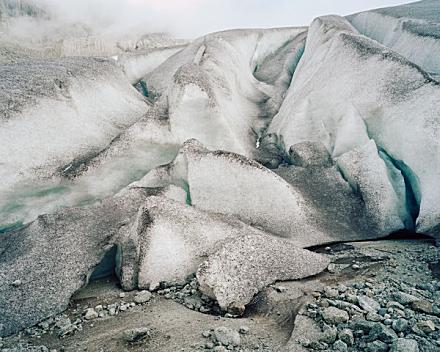
Memento
Tonatiuh Ambrosetti
_______________________
Narratological Amphibiousness,
or: Invitation to the Covert History of Possibility
Lance Olsen
electronic book review
... the imaginings that have interested me most, the ones that have kept me awake the longest, are the relatively covert ones, culturally speaking: those that acknowledge our continual condition of textual, ontological, and epistemological inbetweenness while searching for adventurous forms that can express said condition with what André Breton once called convulsive beauty, thereby capturing the sense of disquieting surprise many of us feel inhabiting these first few seconds of this fresh millennium, this new network of potential presents and potential futures.
These are the imaginings that engage with what I have come to think of lately as Narratological Amphibiousness.
How might fiction and hence perception become richer, these narratologically amphibious imaginings ask by their very presence - these are the imaginings, by the way, that continuously refuse to tell - how might fiction and hence perception become richer by living commensally alongside, in, and/or among several structures and genres and modes of being and seeing at once?
At a local scale, they ask what might happen at the intersection(s) of, say, transgressive fiction and speculative fiction, surfiction and detective fiction, avant-pop pla(y)giarism and surrealist game, pornography and fake memoir.
At a more global scale, they ask what might happen at the intersection(s) of fiction and, say, photography, music, video, theory, poetry, computer games, drama, sculpture, hypermedia, painting.
That is, they conceive of fiction, as Roland Barthes once did, as a multi-dimensional space in which a variety of writings, none of them original, blend and clash. ...a tissue of quotations drawn from the innumerable centers of culture. ...a less upright, less Euclidean space where no one...would ever be in his [or her] final place....(more)
|



 Janus Head
Janus Head

 The Age of Briggs & Stratton
The Age of Briggs & Stratton



































